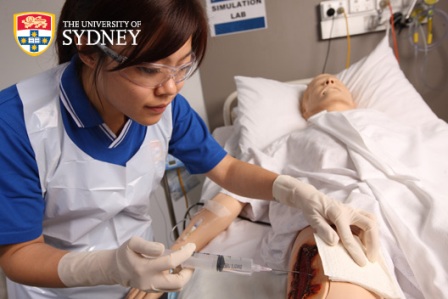Sydney nursing students a vital resource in Vietnam
Thanks to Học Mãi, the Australia Vietnam Medical Foundation, two Master of Nursing graduates, Kate Murchie and Susi Summers, were given the incredible opportunity to travel to Vietnam over the summer to undertake an additional clinical placement. The placement gave them the opportunity to gain invaluable nursing experience and a deeper understanding of issues in the developing world.
How was this placement arranged?
KATE: The Hoc Mai placement and scholarship was offered to Sydney Nursing School students through the Hoc Mai Foundation and Sydney University. The application included an interview, an essay on why I wanted to apply, and details of my academic achievements.

SUSI: The Hoc Mai Foundation offered a scholarship and arranged our placements—working alongside fellow student nurses from the University of Sydney—as well as our peers in other health-related disciplines.
What motivated you to apply for this placement?
SUSI: I was interested in the program because I would eventually like to nurse internationally. I thought it would be a good chance to see another health system in action and develop skills and knowledge in a different culture.
KATE: I wanted to go to work in Vietnam to understand how a different sociopolitical landscape affects the health of a population. Vietnam interested me in particular because of its long and fascinating history of war and unrest. At a grassroots level, I was interested to find out how nurses function in their day-to-day practice in a developing country.
What is life like as a nurse in Vietnam?
SUSI: I went to Vietnam with an open mind, hoping to learn and contribute whatever I could. I was placed at the Da Nang Hospital for Women and Children for a month where I worked alongside two Sydney University medical students.
I spent my first week on the paediatric respiratory ward, mostly administering nebulisers and IV antibiotics, assisting with the medication rounds, and taking patient observations. I saw patients with tropical diseases like dengue fever and Japanese encephalitis, which were new to me. I watched a caesarian section, spent a week in the neonatal ICU and observed babies who had been born prematurely, and with a range of congenital conditions including spina bifida, VATER syndrome.
I was amazed by the generosity of the staff and impressed at the skill and speed with which the children on the wards were treated. The ward routine was completely different to how we do things here in Australia—in some of the wards only two or three nurses would administer IV medications to almost a hundred patients twice a day—it showed me just how vital resource nurses are, particularly in a developing country.
KATE: I worked in the emergency department of the National Paediatric Hospital in Ha Noi. Vietnam is very large country with a huge population and the majority of the population live in rural areas where there is very limited healthcare available. For this reason the sick often present to the city hospitals in very advanced stages of their illness. I had the opportunity to work closely with the doctors and finely tune my paediatric primary assessment and advanced life support skills. Nurses in Vietnam are very busy people and extremely deft at their nursing skills.
In Australia we are far better resourced and have access to more staff, technology and medicines than Vietnam. Although the differences were glaringly obvious, providing care to the rural population in a geographically large country is a challenge we share in Australia too. This encourages me to think about how nurses can identify the need for, and make changes globally.
What was the greatest challenge—for you, or for nurses in Vietnam?
SUSI: The most challenging part of the exchange was definitely patient communication. It can be difficult to gain patient and parental consent without the ability to speak a common language, but this experience has equipped me with techniques to overcome language barriers in the future, and the skills to put patients and their families at ease.
KATE: I also visited a rural hospital to understand the divide between rural and urban healthcare. Overcrowding and lack of resources were the two challenges that leapt out at me during the visit. Despite all the challenges, what became very clear was how stoic and resilient the people of Vietnam are, including their sick and dying.
How did your study prepare you for your placement in Vietnam?
KATE: My degree has taught me to base my nursing practice on current research, to think critically about the evidence, and form clinical decisions independently. This strong foundation helped me to work with confidence in Vietnam. A strong collegial network was also formed during my studies with other nursing students. We are now supporting each other throughout our new graduate year and will no doubt remain in contact throughout our nursing careers.
SUSI: There were many clinical facilitators and staff members who were also good sources of advice and support in preparing. This definitely helped me to get my current job.
About the Hoc Mai foundation and scholarship
The Học Mãi Medical Foundation is a non-profit foundation of the University of Sydney. It was established to unify collective knowledge of Australian and Vietnam in educational partnership.
The Hoc Mai Foundation scholarship is offered in December each year to students of Nursing, Medicine, Public Health, Dentistry and Health science.
Nursing at the University of Sydney
Program: Master of Nursing
Location: Sydney, New South Wales
Semester intake: March
Duration: 2 years
Entry Requirements: A successful applicant for admission to the Master of Nursing will hold a bachelor degree in a discipline other than nursing from the University of Sydney or equivalent qualification; or a Diploma of Aboriginal and Torres Strait Islander Health, or equivalent qualification, and relevant work experience.
Apply to the University of Sydney Nursing School!
*

































Ask A Question
Ask us about your program of interest, or if you have a question about our services.
CONTACT US TODAY